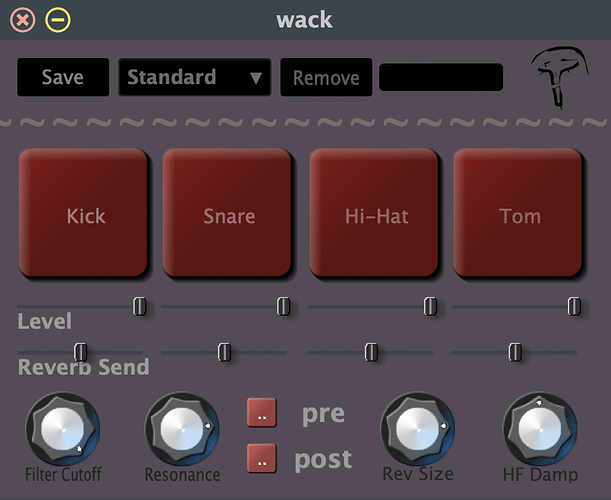Nice work. Your gut instinct is right, there is a better way to do this without all that copy and paste code. The tricky thing is that the schedule and event opcodes don’t allow strings to be passed as p-fields. But one way you can do it is to set up a global array of strings, then pass an index as p4 when calling your one Pad instrument…
; Initialize the global variables.
ksmps = 32
nchnls = 2
0dbfs = 1
event_i "i","get",0,-1
event_i "i","rev",0,-1
#define OUT #outs aout * chnget:k(Slev), aout * chnget:k(Slev)#
gSSamples[] init 4
gSSamples[0] = "./samples/Floor tom 2.wav"
gSSamples[1] = "./samples/Snare 1.wav"
gSSamples[2] = "./samples/hihat 1.wav"
gSSamples[3] = "./samples/kick.wav"
gSPads[] init 4
gSPads[0] = "tom"
gSPads[1] = "snare"
gSPads[2] = "hihat"
gSPads[3] = "kick"
instr get
schedkwhen changed:k(chnget:k("tom")), 0, 0, 100, 0, 1, 0
schedkwhen changed:k(chnget:k("snare")), 0, 0, 100, 0, 1, 1
schedkwhen changed:k(chnget:k("hat")), 0, 0, 100, 0, 1, 2
schedkwhen changed:k(chnget:k("kick")), 0, 0, 100, 0, 1, 3
endin
instr 100
iPad = p4
a1, a2 diskin2 gSSamples[iPad], 1
aout moogladder a1, 20000 * chnget:k("cutoff"), 1 * chnget("res")
Slev = sprintf("%slev", gSPads[iPad])
$OUT
garev += (a1 * chnget:k("tomrev"))
endin
instr rev
(...)
If you renamed your samples to tom, kick, snare and hihat, you could do all of this with a single array and sprintf. 




